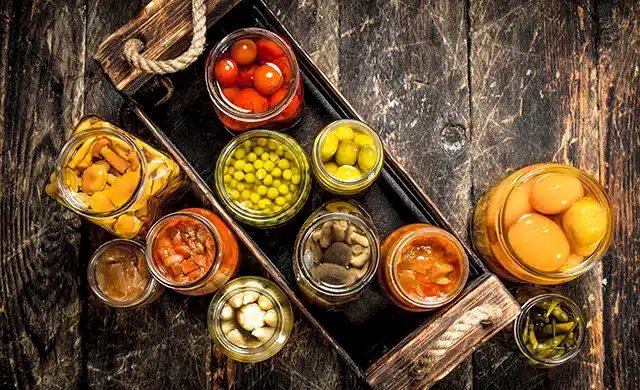
17 Dec Innovation and trends in packaging for canned goods
Índice de contenidos:
The canned food market has undergone a remarkable transformation in recent years, driven by changing consumer habits and sustainability challenges. Factors such as climate change, raw material scarcity and consumer preference for healthy products have generated a need for adaptation that affects not only the products consumed, but also the entire supply chain, with special emphasis on packaging. These changes require agile and innovative responses that enable the sector to meet today’s expectations of sustainability and quality.
According to Alimarket’s 2024 Report on the canned vegetable sector in Spain, inflation and increases in energy and transportation costs have put pressure on the sector, affecting the prices of products such as tomatoes, which registered a 20% increase in 2023. This price increase has had an impact on the volume of consumption in the domestic market, which decreased by 6%, reflecting a drop in the consumption of canned goods in households, especially in products such as asparagus and mushrooms, which had a reduction of more than 10%.
To reverse this trend, the sector has intensified its efforts in innovation, opting for solutions that not only improve the sustainability of packaging, but also provide added value to the consumer. These initiatives include the development of recyclable and biodegradable packaging, designed to minimize environmental impact, together with campaigns that highlight the nutritional quality and versatility of canned foods, seeking to regain consumer confidence and stimulate sales.
Likewise, the canned fish and seafood sector also shows a drop in its activity levels. According to Alimarket’s 2024 Report on the Preserved and Semi-preserved Fish and Seafood Sector in Spain, the industry’s production fell by 5% in 2023 in terms of volume. The shortage of seafood, the increase in canned food prices and the decrease in income have once again affected the domestic consumption of this type of canned food.
To combat the situation, the fish and seafood canning industry has continued to develop projects that have productivity and the search for greater competitiveness as fundamental principles. Added to this is sustainability, with the development of R&D projects to adapt the facilities to the green and digital transition and others to achieve the use of by-products or the reduction of the use of plastics in packaging.
The healthy trend and “green” snacking
The demand for healthy products has transformed the canned vegetable market. Today’s consumers are looking for nutritious and convenient options, such as healthy snacks, foods preserved in extra virgin olive oil (EVOO) and vegetable-based ready meals, that align with their lifestyles. This interest in “healthy” means that packaging is used to clearly communicate the benefits of the products, in addition to presenting convenient and safe formats for consumption anywhere.
In this context, labeled glass containers that display the canned product or stand-up pouches are positioned as an ideal solution. These film pouches with easy closure options, such as zip or easy open, are perfect for products such as vegetables or nuts, among others, allowing an orderly presentation and prolonging freshness. In addition, their design facilitates consumption at any time and place, in line with convenience and functionality trends. As we said before, packaging becomes a showcase to clearly communicate in an attractive way the nutritional benefits of the product while at the same time communicating brand values.
Diversification of canned food products
Product diversification is another canning industry response to today’s challenges. Companies are looking for new ways to reach people through innovative products, such as ready meals, special pickles and new vegan recipes. However, for this diversification to be effective, it is essential for the packaging to reflect the added value of these products, differentiating them from competitors at the point of sale and highlighting their unique benefits.
At Rieusset we work hand in hand with our customers to create labeling and flexible packaging solutions that respond to new market trends and allow product differentiation, such as OPP ROSO labels, sleeves, pouches and paper labels. Thanks to our printing quality, both digital and rotogravure, and our finishing processes, each brand can highlight the unique qualities of its products, with attractive and personalized presentations of very high quality. In addition, the use of sustainable materials, such as paper, mono-material or recyclable (or recycled content) solutions, enables customers to offer environmentally friendly solutions.
Sustainability as a pillar of canned goods packaging
Sustainability is not just an option, but a requirement in today’s canning market. Society demands recyclable and responsible packaging, and legislation is driving companies towards more sustainable practices. At Rieusset, we take this demand seriously, offering labeling and flexible packaging solutions that comply with environmental regulations and help our customers reduce their carbon footprint. With packaging options that reduce the weight of plastics, the use of recyclable materials –such as recycled and recyclable paper labels or mono-material films– and efficient production technologies, we promote a sustainable and responsible supply chain.
Moreover, our commitment to sustainability extends to all our processes, from the recovery of solvents in our emissions –we recover more than 600 tons per year of ethyl acetate which, in a clear exercise of circular economy, we reuse in our printing process– to the constant reduction of our carbon footprint and the continuous reduction of our waste. In doing so, we also help our customers to reduce their carbon footprint. With the right packaging, canning companies can visually communicate their sustainability efforts, positioning themselves as responsible and attractive choices for an increasingly conscious end consumer.
Packaging for canned goods: what we do at Rieusset
Packaging is the customer’s first contact with the product. That’s why at Rieusset we design solutions that not only stand out for their functionality, but also reflect the values of each brand. From versatile film labels to innovative packaging such as stand-up pouches, each proposal combines quality, sustainability and design, enabling our customers to position themselves as leaders in a constantly evolving market.
Discover everything we can do here:
| We Manufacture: | Meet Rieusset: |



